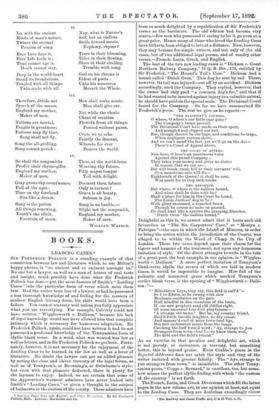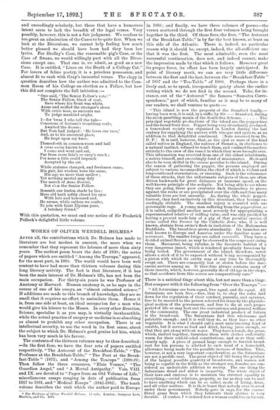BOOKS.
LEADING CASES.* SIR FREDERICK POLLOCK is a standing example of that connection between law and literature which, to use Milton's happy phrase, is "so ancient and so eminent amongst us." No one but a lawyer, as well as a man of letters of real taste and insight, could possibly have done what Sir Frederick Pollock has done,—put the most famous of Smith's "Leading Cases" into the particular form of verse which suits them best. Had the writer been less of a lawyer, or had he possessed a less thorough knowledge of and feeling for the masters of modern English literary form, his skits would have been a failure. You cannot travesty well unless you fully appreciate what you are travestying. For example, Calverly could not have written " Wigglesworth v. Dallison," because his lack of legal knowledge would not have allowed him that complete intimacy which is necessary for humorous adaptation. Sir Frederick Pollock, again, could not have written it had he not possessed a profound knowledge of the Tennysonian form of idyllic blank verse. In a word, what was wanted was law as well as letters, and in Sir Frederick Pollock we get both. Fortu- nately, however, it is not necessary for the enjoyment of the Leading Cases to be learned in the law as well as a lover of literature. No doubt the lawyer can get an added pleasure by noting the close and clever travesty of the legal forms, as well as of Tennyson's, or Browning's, or Swinburne's style ; but even with that pleasure deducted, there is plenty for the layman to enjoy. Indeed, we are certain that some of the Apprentice's warmest admirers have never looked into Smith's 'Leading Cases," or given a thought to the subject of bailments or the custom of the county. These admirers have
• Leading Cases dons into English, and other Dirersions. By Sir Frederick Pollock, Bart. London; Macmillan and Co. been as much delighted by a republication of Sir Frederick's verses as the barristers. The old edition had become very scarce,—few men who possessed it caring to let it go even at a great price. Hence many of those who loved the Leading Cases have hitherto been obliged to love at a distance. Now, however, they may become fee-simple owners, and not only of the old cases, but of two additional legal poems, and of sundry other verses,—French, Latin, Greek, and English.
The best of the two new leading cases is "Dickson v. Great Northern Railway Company," 18 Q. B. Div., 176, entitled by Sir Frederick, "The Hound's Tail's Case." Dickson had a hound called 'Dutch Oven.' This dog he sent by rail. There, however, its tail was injured—cut off by an accident. Dickson accordingly, sued the Company. They replied, however, that the owner had only paid "a common dog's fee," and that if he had wanted to be insured against injury to a valuable animal, he should have paid on the special scale. The Divisional Court found for the Company. So far we have summarised Sir Frederick's poem. The rest we give as he reports :—
"THE PLAINTIFF'S COUNSEL.
0 where, 0 where's our little case gone ?
The Company's terms prevail, The Divisional Court have made us their sport, And mangled and clipped our tail.
Bat, though shrewd be our haps, and conditions be traps, When negligent porters shove,
And we can't mend the fact, yet we'll go on the Act—
There's a Court of Appeal above.
THE COURT OF APPEAL.
Now here, 0 here's an unanimous voice Against this proud Company ; They takes your money and gives no choice In reason, that we can see ; But will break, steal, kill at their servants' will,
Or a monstrous rate will fix—
Eighteenth of the Queen,' it shall be seen, Was made for to stop such tricks.
THE REPORTER.
But where, 0 where is the tailless hound, And what shall be done with he ?
Shall a place for him in the Court be found, The Lords Justices' dog to be ?
With glory increased, a reported beast, Though he course no more on ground, He shall hunt like a spectre the grasping Director, Dutch Oven' the tailless hound."
Delightful as this is, we cannot admit that it beats such old favourites as "The Six Carpenters' Case," or " Mostyn. v. Fabrigas "—the case in which the Island of Minorca, in order to bring the action within the jurisdiction of the Courts, was alleged to be within the Ward of Cheap in the City of London. These two cases depend upon their charm for the vigour and humour of the treatment, not upon any humorous imitation of style. Of the direct attempts to write in the vein of a great poet, the best example, in our opinion, is "Wiggles. worth v. Dallison." A more perfect imitation of Tennyson's blank-verse idylls, the scenes of which are laid in modern times, it would be impossible to imagine. How full of the pedantic and mannered grace which marked Tennyson's earlier blank verse, is the opening of " Wigglesworth v. Dalli. son :"—
" Hibaldstow Leys, they say, this field is call'd '—
So I to Edwin, as he swung with slow Mechanic oscillation on the gate, Half mindful in dim chambers of the brain, If our new prophets read old riddles right,
Of some ancestral four-foot playfulness—
'A strange old name.' But he, my country friend, Peed forth bucolic laughter, no dry crease And measur'd curl of nicer town-bred lips, But full cachinnant music from the lungs Catching the half form'd word : Ay, strange to you Strangers from town—but I—we know them well,
The field and the field's tenant."
As an exercise in that peculiar and delightful art, which is not parody, or caricature, or travesty, but something better, this is beyond praise. Even Crabbe's poem in the Rejected Addresses does not catch the style and ring of the
writer imitated with greater felicity. The "Aye, strange to you strangers from town," is inimitable. The other Tenny- sonian poem, " Coggs v. Bernard," is excellent, too, but some. how misses the perfect idyllic feeling with which "the custom of the country" is set forth.
The French, Latin, and Greek Diversions which fill the latter pages in the new volume are, in our opinion at least, not equal to the Leading Cases. They are doubtless exceedingly clever
1 The Railway and Canal Traffic Act, 17 & 18 Viet. 0. 31.
and exceedingly scholarly, but those that have a humorous intent seem to lack the breadth of the legal verses. Very possibly, however, this is not a fair judgment. We confess to too great an admiration of the Cases to be quite fair. When we look at the Diversions, we cannot help feeling how much better pleased we should have been had they been law lyrics. For Shelley's Case, the reasonable pig's Case, or the Case of Swans, we would willingly part with all the Diver. sions except one. That one is, we admit, as good as a new Case. It is entitled, "Lines on the Death of a College Cat." For lovers of feline poetry, it is a priceless possession, and almost fit to rank with Gray's immortal verses. The elegy in question describes how the author was admitted to the Com- mon Room of his College on election as a Fellow, but how this did not complete the full initiation :—
"One said, The Senior Fellow's vote ! ' The Senior Fellow, black of coat,
Save where his front was white, Arose and sniffed the stranger's shoes With critic nose, as ancients use To judge mankind aright.
I—for 'twas I who tell the tale—
Conscious of fortune's trembling scale, Awaited the decree ; But Tom had judged : He loves our race,' And, as to his ancestral place, He leapt upon my knee.
Thenceforth in common-room and hall A verus socius known to all
I came and went and sat,
Far from cross fate's or envy's reach ; For none a title could impeach Accepted by the cat.
While statutes changed, and freshmen came, His gait, his wisdom were the same, His age no more than mellow ; Yet nothing mortal may defy The march of Anne Domini, Not e'en the Senior Fellow.
Beneath our linden shade he lies ; Mere eld hath softly closed his eyes With late and honoured end. He seems, while catless we confer, To join with faint Elysian purr, A tutelary friend."
With this quotation, we must end our notice of Sir Frederick Pollock's delightful little volume.



































 Previous page
Previous page